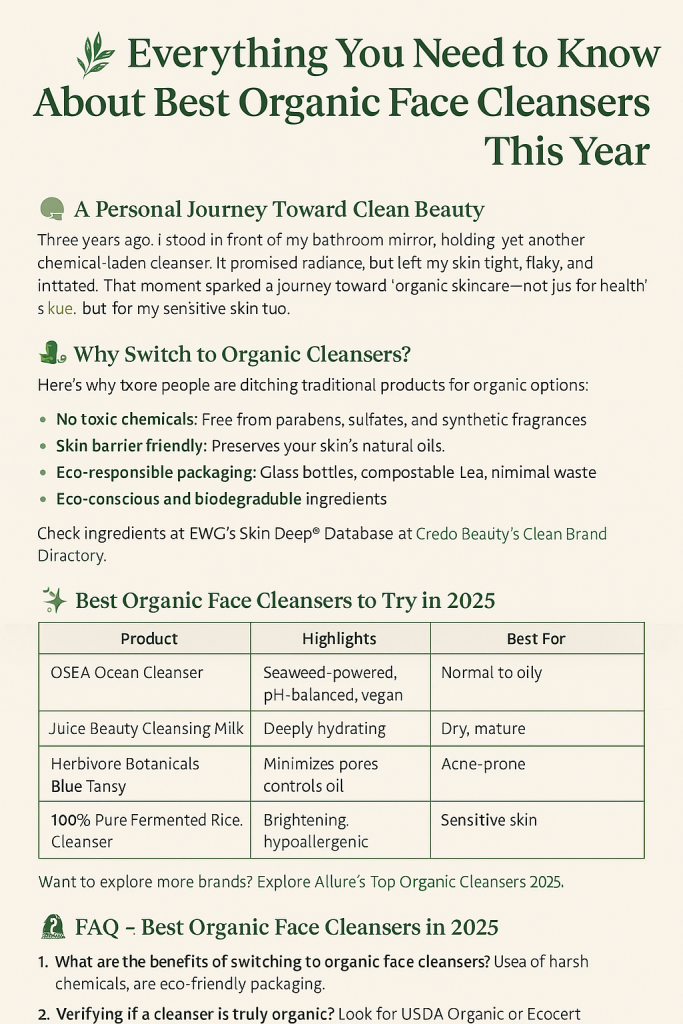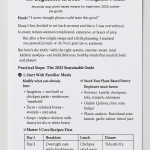💬 A Personal Journey Toward Clean Beauty
Three years ago, I stood in front of my bathroom mirror, holding yet another chemical-laden cleanser. It promised radiance, but left my skin tight, flaky, and irritated. That moment sparked a journey toward organic skincare—not just for my sensitive skin, but for the planet’s health too.
Fast forward to 2025, and I’ve never looked back. Today, I’m sharing everything you need to know about the best organic face cleansers and how to make your routine cleaner, greener, and more effective than ever.

🌱 Why Switch to Organic Cleansers?
Here’s why more people are ditching traditional products for organic options:
- 🧪 No toxic chemicals: Free from parabens, sulfates, and synthetic fragrances
- 🧬 Skin barrier friendly: Preserves your skin’s natural oils
- 🧴 Eco-responsible packaging: Glass bottles, compostable refills, minimal waste
- 🌍 Sustainable sourcing: Plant-based ingredients grown without pesticides
Curious about what’s in your current cleanser? Check the ingredients at EWG’s Skin Deep® Database to see toxicity scores and safety rankings.
✨ Benefits of the Best Organic Face Cleansers
Organic cleansers are not just “clean”—they’re functional, skin-loving, and earth-conscious. Top benefits include:
- 🌸 Gentle cleansing without stripping
- 🌿 Infused with natural actives like green tea, aloe vera, and chamomile
- 🐰 Cruelty-free and vegan certified by groups like Leaping Bunny
- 🌎 Eco-conscious and biodegradable ingredients
Want to explore more brands? Browse trusted clean beauty options at Credo Beauty’s Clean Brand Directory.
🧴 How to Choose the Right Organic Cleanser
Finding the perfect cleanser starts with knowing your skin and reading between the (ingredient) lines:
1. Match your skin type
- Oily/Acne-prone: Choose clay-based or charcoal formulas
- Dry/Sensitive: Go for creamy cleansers with jojoba, oat milk, or rosewater
2. Look for trusted certifications
- ✔️ USDA Organic
- ✔️ Ecocert
- ✔️ COSMOS Natural
3. Simplify the ingredients
- Fewer is better—avoid sulfates (SLS), PEGs, synthetic dyes, and “fragrance”
4. Eco-packaging matters
- Prefer glass or post-consumer recycled plastic. Some brands offer refill systems or even compostable paper pods!
🌟 Best Organic Face Cleansers to Try in 2025
Here are my tried-and-true favorites for every skin type:
| Product | Highlights | Best For |
|---|---|---|
| OSEA Ocean Cleanser | Seaweed-powered, pH-balanced, vegan | Normal to oily |
| Juice Beauty Cleansing Milk | Grape, chamomile, deeply hydrating | Dry, mature |
| Herbivore Blue Tansy Cleanser | Minimizes pores, controls oil | Acne-prone |
| 100% Pure Fermented Rice Cleanser | Brightening, hypoallergenic | Sensitive skin |
Want more expert picks? Explore Allure’s Top Organic Cleansers of 2025.
🧘♀️ The Transition Phase: What to Expect
Switching from synthetic to organic may come with a short adjustment period (1–2 weeks), as your skin rebalances its oil production and detoxifies.
Don’t worry if:
- You experience mild purging in the first few days
- You feel less foam or scent—it’s natural!
Pro tip: Follow with an organic toner and plant-based moisturizer for best results.
💡 Final Thoughts: A Small Change That Lasts
Switching to an organic face cleanser might feel small, but it’s a powerful first step in building a clean beauty routine that benefits your skin and the planet.
Start here:
✅ Swap one conventional cleanser for a certified organic alternative.
✅ Track how your skin feels after 7–14 days.
✅ Bonus: Inspire someone around you to do the same 🌎
Let your face wash routine be a reflection of your values—kind, gentle, and honest.
🙋♀️ FAQ – Best Organic Face Cleansers in 2025
1. What are the benefits of switching to organic face cleansers?
Organic products use natural ingredients, are free of harsh chemicals, and often come in eco-friendly packaging.
2. How do I verify if a cleanser is truly organic?
Look for USDA Organic or Ecocert certifications. Use EWG Skin Deep to research ingredient safety.
3. Are they effective for acne-prone skin?
Yes! Look for tea tree, salicylic acid (plant-derived), or charcoal-based formulas.
4. Do they expire faster than conventional cleansers?
Yes, typically within 6–12 months after opening due to minimal preservatives.
5. Can men use organic face cleansers too?
Absolutely! Many organic brands offer neutral or minimal-scent cleansers great for male skin.
6. How do I transition without irritating my skin?
Phase it in slowly. Use it every other day at first to allow your skin to adjust.
7. Do they foam like regular cleansers?
Some do, especially with coconut-derived surfactants. But foaming is not essential for cleansing.
8. Which ones are best for sensitive skin?
Creamy options with chamomile, aloe vera, or calendula are ideal.
9. Where can I explore more organic beauty options?
Try Credo Beauty or browse trusted recommendations at Allure.
📢 Ready to Go Clean?
💬 Got a favorite organic cleanser? Drop it in the comments below!
📩 Want more sustainable skincare tips? Subscribe to Hazel’s Green Life for weekly inspiration.
🔗 Bookmark EWG Skin Deep and Credo Beauty to explore clean beauty smarter.

